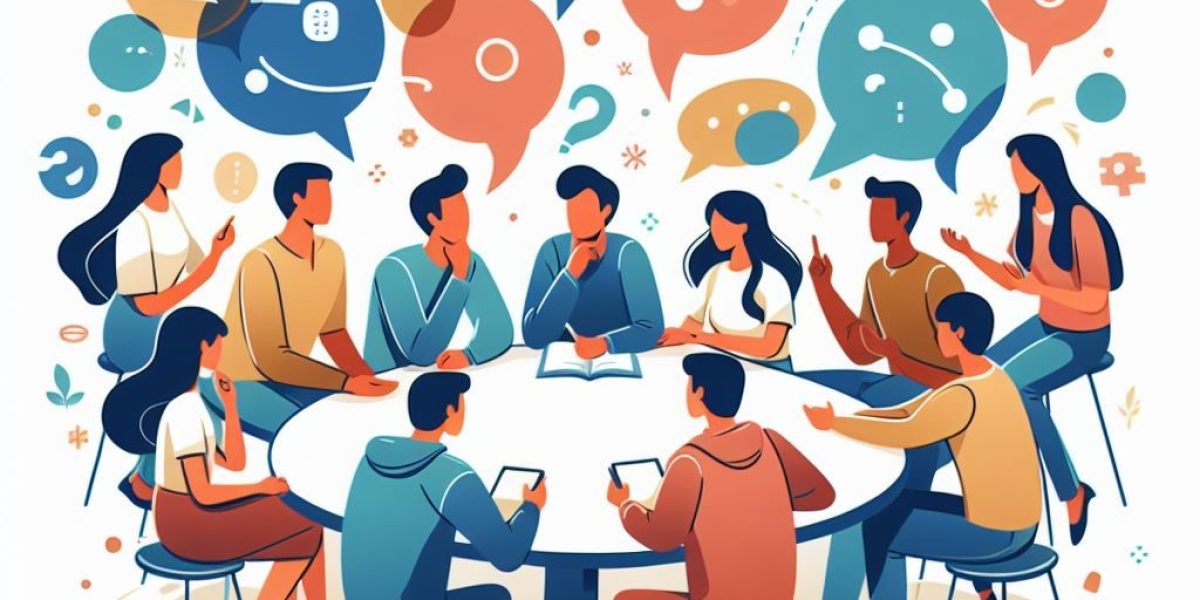A group discuss or a GD is a discussion by a group of participants on a given subject . Your role is to be a part of that discussion and present your thoughts , opinions and conclusions .
How it works is that you will be put in a group ( generally around 8 -15 people) , you are given a topic and some time to read and collect your thoughts and points , and then its asked by the group to discuss on the topic. There is a panel who monitors the discussion and rates you based on there observations of you.
Few types of group discussion are
- factual group discussion -topics based on day to day events or subjects related socio economic and political dynamics
- opinion based group discussion – topic are such, that tests how candidates put forward there opinion and views , its less based on facts
- Case studies – a hypothetical situation is given and the expected to solve it together .
- Abstract group discussion – are about intangible topics and help to bring out the creative thinking.
For NIFT focus on 1,2 and 4
First try to understand what is being tested – Its your knowledge on a random subject matter , your comfort to speak spontaneously on any subject , your communication skill and body language , and most importantly how good team player are you .Thats it nothing else is under test
A lot of non verbal attributes are similar to what I have explained in personal interview , however there are some additional .So few tips that will help you to take your performance from good to great .
- Taking the initiative
This is a great opportunity where a candidate can distinguish himself from the rest , take initiative by starting or/and ending the discussions. However its is only recommended if you are very familiar with the topic of discussion or you have good speaking skills , specially spontaneous communication.
To start the discussion , say hello to all candidates and jury , quickly explain the topic and put forward your views , once you are done instantly pass it over to the other person
To end , you need to summarize main points from the discussion. Keep your points ready do you don’t miss any.
If you don’t feel like to start , don’t worry , your content and timing is most important and will gain you recognition. Once the opening is done , start at your ease , take the command by saying “adding to my fellow candidate …” , express your points in go 2-3 minutes and then passes over to the next person who is interested.
- Listen more and speak less
This is the most important point that is generally ignored, By listening actively you will get more ideas from other which you can elaborate, understand whats missing and what needs to be added and it gives you time to structure your content.
Also realize on a very higher side you just need to speak 5-7 minutes altogether . Its should not be in one go but should be evenly distributed, a lot can just be expressing agreement with people .
- Mind your body language , you are being watched
There are jury panel that are watching and rating you throughout , even when you are not speaking . So keep you body language formal and attentive all the time .
When speaking try to glance through most of the group members, you are putting your point through to the complete group , not just one person and specially not the jury,
When summarizing and concluding ,then you should look at both your jury and you fellow candidates
- Learn to agree with people
If the points someone had made is similar what you think , agree and complement the point , and elaborate it a little more .
With this you get two things done firstly it shows you as a good team player and secondly it helps you to put a solid point forward without much effort .
- Drive the discussion be a leader
Take leadership initiatives , this will put you in instant limelight .
As an example , if few people have not spoken or spoken less , give them chance. Take the command and tell them as we will have to conclude the groups findings shortly if there are any points they would like to make and listen/support them in how they what to express.
- Practice public speaking on variety of topics
The one and only thing that makes you better is practice. Repeat this exercise few times over the week , ask friends and family to give you a topic , take 5 minutes to put your points and then speak whats on you mind. Ask them for feedback , make points and repeat the process again. If you don’t want to do it with another person you can do it alone , just as in this case you wont have direct feedback , try to understand on areas you were getting stuck or having difficulty.
Firstly it won’t be easy , it never is , but it will give you good practice to break down and structure content and speak
- Remember the core
While practicing and while doing a live group discussion remember it’s a discussion by a group of individuals who will have different views and ideas, Your job is to facilitate discussions so everyone gets a chance, express your point of view , respect what others have to say and conclude what the the group thinks. That’s it , nothing else
Remember few things – speak confidently , give others chance to speak , have good etiquette , try to move on if the discussion if its getting stuck , be mindful of the time and make the group realize that, do not push yourself to be an alpha personality and think like a leader.
Group discussions are a great way to exchange ideas, learn from others, and improve communication skills. Here are some interesting group discussion topics that you can explore
- Current Affairs and Social Issues:
- Climate Change: Discuss the impact of climate change on our planet and potential solutions.
- Digital Privacy: Explore the balance between privacy and surveillance in the digital age.
- Gender Equality: Deliberate on achieving true gender equality in all aspects of life.
- Healthcare Reforms: Analyze healthcare systems and propose reforms for better access and affordability.
- Social Media Influence: Discuss the impact of social media on society, mental health, and relationships.
- Economic and Business Topics:
- Globalization: Debate the pros and cons of globalization in today’s interconnected world.
- Cryptocurrencies: Explore the rise of cryptocurrencies and their implications for the economy.
- Startup Culture: Discuss the challenges and opportunities faced by startups.
- Automation and Job Displacement: Examine the effects of automation on employment.
- Abstract Discussion Material:
- Artificial Intelligence: Dive into the ethical, economic, and societal implications of AI.
- Utopian vs. Dystopian Futures: Imagine and debate different visions of the future.
- Creativity and Innovation: Explore how creativity drives progress and innovation.
- Case Studies and Real-Life Scenarios:
- Ethical Dilemmas: Analyze complex ethical situations and propose solutions.
- Corporate Scandals: Discuss the impact of corporate misconduct on trust and reputation.
- Success Stories: Share inspiring stories of individuals or companies overcoming challenges.
- Short Stories and Literary Themes:
- The Butterfly Effect: Reflect on how small actions can lead to significant consequences.
- The Power of Empathy: Discuss the importance of empathy in personal and professional relationships.
- The Quest for Identity: Explore themes of self-discovery and identity in literature.
Remember, the key to a successful group discussion is active listening, respectful communication, and thoughtful contributions. Enjoy your discussions!








